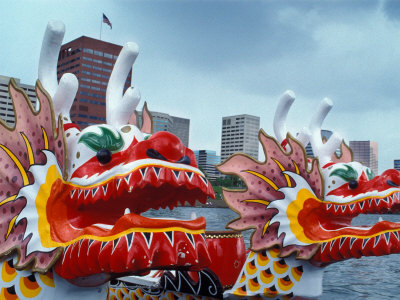Posted on May 27, 2009

It defies logic: a mandatory national holiday to commemorate an accused traitor, one who opposed China’s founding dynasty? And we celebrate with dragon boat racing and sticky rice?
We’ve obviously lost much of the meaning in the Dragon Boat Festival. But in marketing terms, that hardly matters. Across China, shopping plazas have zongzi stands set up out front, the mounds of steamed gluten a healthy alternative to the moon cake pyramids that will replace them a few months from now.
The boat racing? A master stroke. Tomorrow, cities from Boston to Melbourne will make a gala day of it. Nothing sells cross culture like some healthy competition. Too bad Buddha didn’t advocate groups of disciples running a ball into each other’s side of the field; today, schoolchildren would have morning mantras.
Cheers to the dragon boat racers, and enjoy the time off if you’re in China. But for skinny-ankled intellectual types, the truly China curious, and those, who like Dirty Harry’s victims, just gots to know, we’re going to dig a little deeper into the Dragon Boat Festival.
A quick recap of the official story. Qu Yuan, loyal counselor to the King of Chu, warns him against cozying up to the juggernaut State of Qin. Instead, he advises forming an alliance against it. Corrupt officials, jealous of Qu’s close ties with the king, trump up treason charges and get him exiled. The banished Qu wanders the country composing epic poetry and wasting away in worry for his state. Years later, when Qin captures the Chu capital, Qu composes a final poem, Lament for Ying, then drowns himself in the Miluo River, ritual protest and dramatic “told you so” in one.
So the boats represent the villagers’ frantic attempt to save a noble patriot. The splashing paddles and beating drums scare the fish that would eat such an idealistic corpse, and we eat zongzi because throwing rice in the river was a last attempt to distract fish not otherwise scared off by the paddles and drums. Why then is painting the eyes on the dragon boat such an important part of every race?
The answer is complicated. Consider a less-often related part of Qu Yuan’s story, in which his spirit reappeared later before his friends, claiming that a river dragon had killed him. He instructed them in fashioning tri-cornered zongsi to placate the dragon. Consider also that Qu had a predecessor with a similar story, who was already being commemorated in China before Qu had even been born.
Another son of the State of Chu, Wu Zixu fled to the kingdom of Wu on the imprisonment of his high-ranking father. He helped in the design of Suzhou’s renowned canal system, and performed other noble work, but was also done in by the connivance of treacherous ministers, in this case Bo Pi, who was on the payroll of rival state Yue. The King of Wu ordered Wu Zixu to commit suicide, whereupon he was flung into a river. Soon after began the worship of Wu Zixu as a river god, called “God of Waves”. In Suzhou and Jiangsu, Wu Zixu is still honored during the Dragon Boat Festival to this day.
The connection springs from the fact that, in China, the gods of water are dragons, not double-crossed courtiers. The four dragon kings rule the seas and rivers, but also control clouds and rain, often to disastrous effect when punishing humans for their transgressions. Propitiating a powerful god seems a much better reason to throw rice stuffed with costly sweet meats into a river than to honor a tragic nobleman/poet, at least from the perspective of an ancient agrarian society. Before Wu Zixu, that is precisely why the people of Yue made such offerings. Taking the time to craft an ornate dragon boat fits the dragon-worship theory much more nicely, too.
Dragon worship involves much more than an ignorant fear of monsters. Duanwu, or “Double Fifth”,as the Dragon Boat Festival is called in Mandarin, marks the beginning of mid-summer, when the sun is at its strongest. The sun is the elemental representation of yang, male energy. It is not much of a leap to transfer veneration from the sun to the mythical symbol of yang energy, China’s symbol, the dragon.
The dog days of summer meant something quite different to ancient Chinese than beach trips and lemonade, of course. In towns without plumbing or what we otherwise consider basic sanitation services, extra sun meant extra-stinky piles of refuse, clouds of flies, and the onset of plague. Thus is Duanwu celebrated by the truly observant with a little more than eating and racing.
For protection against the evils that summer brings, you must hang sweet flag and mugwort on your front door. The former, also known as calamus, enjoys an ancient reputation as both an aphrodisiac and a nervous-system rejuvenator. The latter, also called moxa, is the key ingredient in the Chinese medicinal practice of moxibustion, and stimulates blood flow to the internal organs, especially reproductive. Your door display is incomplete without a picture of Zhong Kui, celestial bane of evil spirits.
Relax from your efforts with a cup of Xiong Huang, rice wine flavored with realgar, an arsenic-sulphur compound. Too much will put you in the ground, but the right dose is sovereign for killing intestinal parasites. Fortified by your cocktail, proceed to sew silk pouches stuffed with potpourri and hang them about your children’s necks. The evil spirits won’t go near them; neither will their self-respecting friends.
To praise the dragon and protect against the harm his potent yang energy may bring – now that sounds like a reason for the Chinese of old to take a day off. Perhaps the re-branding springs from a desire to seem more refined and less superstitious. Whatever the case may be, China Expat wishes you a happy Dragon Festival.
